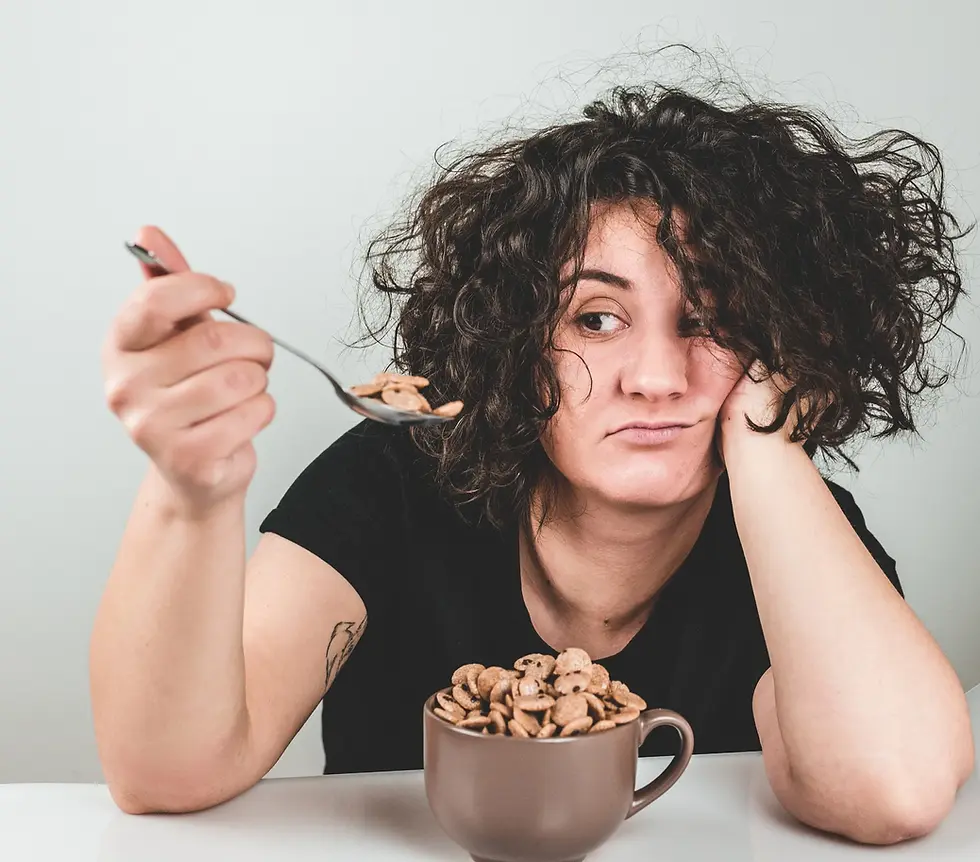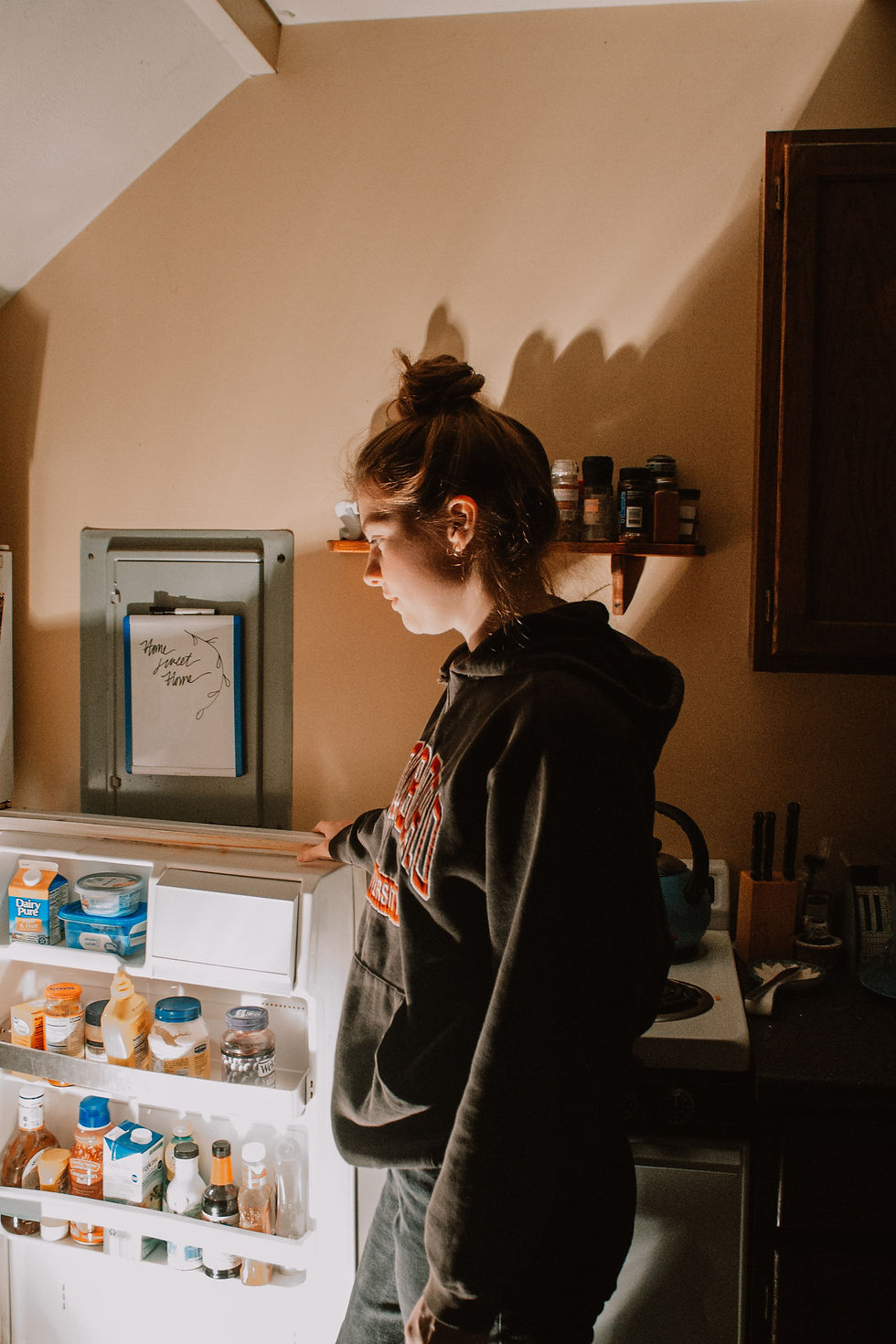Do you have a complicated relationship with food? Perhaps you use food to help you deal with emotional issues like stress, or maybe you have unhealthy weight control thoughts and behaviours around food such as skipping meals then overeating or excessively exercising. If issues around food are dominating your everyday thoughts, then now is the time to take positive action and get back control of your eating habits…

Disordered eating – what is it?
Disordered eating is a term applied to abnormal or obsessive behaviours around food that can become a huge problem in a person’s life, affecting relationships, ability to socialise normally, leading to poor self-esteem and often feelings of self-loathing. These abnormal eating behaviours do not warrant the label of an eating disorder but nevertheless can seriously affect a person’s enjoyment of life. Disordered eating is a descriptive phrase not a diagnosis.
What are the symptoms of disordered eating?
There are many symptoms associated with disordered eating, these are some of the most common ones:
Frequent dieting, anxiety associated with specific foods or meal skipping
Chronic weight fluctuations
Rigid rituals and routines surrounding food and exercise
Feelings of guilt and shame associated with eating
Preoccupation with food, weight and body image that negatively impacts quality of life
A feeling of loss of control around food, including compulsive eating habits
Using exercise, food restriction, fasting or purging to "make up for bad foods" consumed
Using food substitutes, diet pills and supplements instead of eating real food
Potential harms of disordered eating:
Lack of, or minimal, awareness that there is a problem leading to exacerbation of harms
Increased risk of obesity or development of an eating disorder
Physical stress: bone loss, gastrointestinal disturbances, electrolyte and fluid imbalances, low heart rate and blood pressure,
Mental stress: increased anxiety, depression and social isolation.

Disordered eating and obesity:
Two types of disordered eating are associated with obesity – binge eating disorder (BED) and night eating disorder (NED) (1)
BED: This is when a person eats a large amount of food in a short period of time – more than other people would do. There is also a feeling of loss of control around eating behaviours, eating very rapidly, eating until over-full, eating when not hungry, often eating alone and feeling disgusted or guilty after the binge-eating episode.
NED: This is when a person has a strong urge to either eat excessive amounts of food in the evening (after dinner) or frequently get up to eat in the night when waking up from sleep. They may often experience a lack of hunger in the morning, have a depressed mood, particularly in the evening, and a belief that they can’t get back to sleep without eating.
Shared risk factors for disordered eating and obesity:
Many risk factors for disordered eating and obesity are shared and include:
Feeling under pressure to conform to society’s expectations of ‘normal weight’
Being teased about weight
Being exposed to unhealthy diets and eating habits by parents or peers
Excessive dieting
Fear of failure or criticism
Obsession with media images of health and beauty
Dissatisfied with own body
An inability to feel pleasure, or feelings of depression
Childhood trauma
Genetics

What help is there for people affected by disordered eating?
The good news is there is lots of help for people who suspect they may have disordered eating. Disordered eating responds very well to counselling, psychotherapy and cognitive behaviour therapy (CBT).
First, you can assess your own eating behaviours using the online EAT-26 questionnaire. This questionnaire asks you a series of questions about your diet and eating behaviours and then gives you a score. If you score 20 or less, then you do not have disordered eating. However, a score above 20 suggests a possible eating disorder but this is not diagnostic, however you should discuss it with your doctor or self-refer yourself to a service in your area (see below).
It is not wise to embark on a weight loss programme until you have had help for any disordered eating pattern you may have.
Services available:
Local services for Sheffield, UK:
South Yorkshire Eating Disorder Association. They provide a range of free counselling, support and self-help services for people in South Yorkshire with disordered eating or eating disorders. Clients can self-refer.
MIND. Provide a range of free mental health services for people in Sheffield. Self-referral possible but most services currently closed due to covid19.
Overeaters Anonymous. Provides insight into the problems of eating compulsively, gives strength to deal with it, and provides a real hope of a solution.
IAPT (Improving Access to Psychological Therapies) is a NHS service which provide psychological treatments for anybody suffering from stress, anxiety and depression. Can self-refer to an online therapy programme or have 1:1 Skype or phone appointments.
Share. A Sheffield based charity which offers low cost psychotherapy services including Art Thearpy, CBT and Person-Centred Psychotherapy for people with a range of emotional problems. There are some places for longer term therapy. Clients can self-refer via an online application form.
National Services:
Psychology Today. A list of private psychologists and counsellors in your area who can work with people with eating disorders. Search on your postcode and then select ‘eating disorders’ under the ‘issues’ tab. https://www.psychologytoday.com/gb/counselling
Eating disorders. A private Yorkshire based company providing online psychological counselling for people with disordered eating and eating disorders https://www.eatingdisorders.uk.com/seeking-help-for-disordered-eating.html
Weight Matters. A private London based psychological support and nutrition company that specialises in weight loss and disordered eating. They provide packages combining nutrition with psychological counselling and exercise coaching. Online packages available.
Self-help services:
Facebook support groups:
Disordered Eating support group (Facebook) https://www.facebook.com/Disordered-Eating-Support-Group-1129203693880593
Binge Eating Recovery group (Facebook)
Binge Eating Disorder Weight Loss Support (Facebook) https://www.facebook.com/groups/1632962310267715


Comments